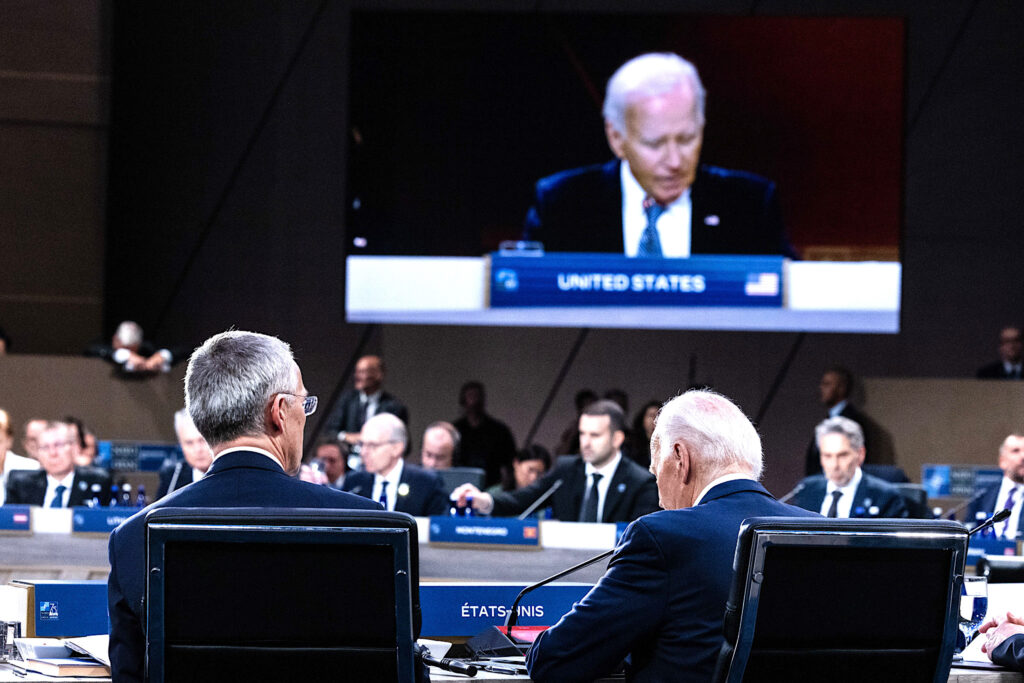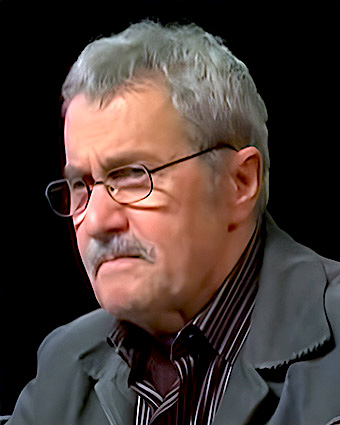NATO Summit: Not a Shield but a Bloodied Sword
NATO, 15 Jul 2024
John Wight | Consortium News - TRANSCEND Media Service

Opening remarks by U.S. President Joe Biden on 9 Jul 2024 at the 75th anniversary summit in Washington DC. (NATO/Flickr, CC BY-NC-ND 2.0)
When leaders of the military pact’s member states pontificate about its invaluable role in defending democracy, you can almost hear history guffawing in the background.
12 Jul 2024 – The current and ongoing conflict in Ukraine reminds us that the existence of NATO 75 years on from its creation stands as an insult to the millions who died in WWII so that the U.N. Charter could be born.
Produced as the foundational document of the United Nations upon its birth in October 1945, enshrined within the charter’s articles was a solemn pledge that henceforth justice, international law and tolerance would reign in place of brute power, force and intolerance.
Consider for a moment the first section of the charter’s preamble:
“WE THE PEOPLES OF THE UNITED NATIONS DETERMINED
to save succeeding generations from the scourge of war, which twice in our lifetime has brought untold sorrow to mankind, andto reaffirm faith in fundamental human rights, in the dignity and worth of the human person, in the equal rights of men and women and of nations large and small, and
to establish conditions under which justice and respect for the obligations arising from treaties and other sources of international law can be maintained, and
to promote social progress and better standards of life in larger freedom.”
It is impossible to read those words and not lament the gaping disjuncture between the noble ideals they pledged to uphold and the grim reality that arrived in their wake.
For rather than mankind being saved from the “scourge of war,” rather than “respect for the obligations arising from treaties and other sources of international law,” the scourge of war and violation of treaties and international law have grown to become a near-everyday occurrence across the globe.
The pressing question we are required to grapple with today is the question of why? What lies at the root and what is the common denominator responsible for mankind’s abject failure to achieve the vision set out in the U.N. Charter?

Monument to U.N. Charter at United Nations Plaza in San Francisco. (Ken Lund, Flickr, CC BY-SA 2.0)
Upon due consideration, we are left in no doubt that, fundamentally, the series of conflicts that have come to define our existence are a consequence of the drive by one ideological bloc to dominate and impose a particular political, economic and value system onto a world defined by its diversity of languages, cultures, histories and traditions.
The result is the normalization of war and the apotheosis of hard power, rather than war and hard power being regarded as grotesque perversions and an impediment to human progress.
Seventy-five-years ago NATO, a military alliance whose entire existence and ethos is predicated on “might is right,” emerged from the womb of the Cold War objectives devised by a Truman administration of fanatical hawks, consumed with the goal of full-spectrum dominance at the close of WWII.
In his 1997 essay, “The Last Empire,” Gore Vidal savages the official history proffered by Western ideologues when it comes to the sudden shift that took place from Moscow being viewed as an indispensable ally in the war against Nazi Germany in the eyes of the Roosevelt administration, to implacable foe when Truman entered the White House upon Roosevelt’s death in April 1945.
Vidal:
“The National Security State, the NATO alliance, the forty-year Cold War were all created without the consent, much less advice, of the American people… The impetus behind NATO was the United States… We were now hell bent on the permanent division of Germany between our western zone (plus the British and French zones) and the Soviet zone to the east. Serenely, we broke every agreement that we had made with our former ally, now horrendous Communist enemy.”

Vidal speaking for the People’s Party in 1972. (Susmart, CC BY-SA 3.0, Wikimedia Commons)
Moving things forward, it is by now no secret that U.S. Secretary of State James Baker assured Soviet premier Mikhail Gorbachev in a meeting on Feb. 9, 1990 that NATO would not expand “one inch eastward” upon the reunification of Germany.
According to declassified documents, Baker’s pledge was made as part of a “cascade of assurances” over Soviet security given by Western leaders at that time and on into 1991, when the Soviet Union came to an end. It is the breaking of those assurances that lies at the heart of the deterioration in relations between East and West that has taken place since, and which informs the current conflict in Ukraine.
Flush with triumphalism over the demise of the Soviet Union in the early 1990s, NATO was loosed upon the world not in name of democracy but in the cause of imperialism. Neocon scribe Thomas Friedman wrote openly of the driving ethos of Western foreign policy after the Soviet Union’s demise:
“The hidden hand of the market will never work without a hidden fist — McDonald’s cannot flourish without McDonnell Douglas, the builder of the F-15. And the hidden fist that keeps the world safe for Silicon Valley’s technologies is called the United States Army, Air Force, Navy and Marine Corps.”
Friedman’s unabashed celebration of the economic opportunities lying open to the U.S. in the post-Soviet world was shared by power brokers in Washington on both sides of the aisle. Intoxicated with a misplaced sense of exceptionalism and virtue, the world now lay before them like a vast banquet upon which they were invited to feast.
The first course in this feast was the former Yugoslavia, which with its abundant human and natural resources, not to mention strategic location in the Balkans, was deemed ripe for the taking.

Parenti in 2012 while delivering the speech “Democracy and the Pathology of Wealth” in Berkeley, California. (Wikimedia Commons, CC BY 3.0)
Michael Parenti, in his definitive work on the destruction of Yugoslavia, To Kill A Nation, points out that after the fall of communism in eastern Europe
“the Federal Republic of Yugoslavia (FRY) remained the only nation in that region that would not voluntarily discard what remained of its socialism and install an unalloyed free market system. It also proudly had no interest in joining NATO.”
The decisive role of NATO in achieving the West’s objectives in the former Yugoslavia need not detain us.
The point is that today — bearing in mind NATO’s role in the dismemberment of Yugoslavia, its role in helping turn Afghanistan into a failed state, its critical role in toppling Muammar Gaddafi in Libya and turning that country into a failed state, and its stance in threatening Russia’s security in Eastern Europe — it is no longer feasible or possible to harbour any lingering belief that NATO is anything other than a tool of U.S. hard power, deployed not to protect and defend, but to destroy and dominate.
Whenever you hear U.S. President Joe Biden and other leaders and officials of NATO-member states pontificate about the invaluable role NATO plays in defending democracy in an evermore dangerous and volatile world, you can almost hear history guffawing away in the background, what with NATO’s inarguable role in creating this danger and volatility.
NATO’s disbandment and the embrace of the principles enshrined in the U.N. Charter are long overdue. Because if the decades since the demise of the Soviet Union have confirmed one thing above all others, it is that the overriding challenge facing humanity is not the lack of democracy within certain states, but the lack of democracy among all states.
Until the latter is achieved the former will always remain the product of the asphyxiating effects of Western imperialism and its bastard child, hegemony.
NATO is not a shield it is a sword, covered in blood.
_______________________________________________
John Wight, author of Gaza Weeps, 2021, writes on politics, culture, sport.
Go to Original – consortiumnews.com
Tags: Anti-NATO, Arms Race, European Union, Hegemony, Imperialism, Military Industrial Media Complex, NATO, Pentagon, USA, Ukraine, Youth against NATO
DISCLAIMER: The statements, views and opinions expressed in pieces republished here are solely those of the authors and do not necessarily represent those of TMS. In accordance with title 17 U.S.C. section 107, this material is distributed without profit to those who have expressed a prior interest in receiving the included information for research and educational purposes. TMS has no affiliation whatsoever with the originator of this article nor is TMS endorsed or sponsored by the originator. “GO TO ORIGINAL” links are provided as a convenience to our readers and allow for verification of authenticity. However, as originating pages are often updated by their originating host sites, the versions posted may not match the versions our readers view when clicking the “GO TO ORIGINAL” links. This site contains copyrighted material the use of which has not always been specifically authorized by the copyright owner. We are making such material available in our efforts to advance understanding of environmental, political, human rights, economic, democracy, scientific, and social justice issues, etc. We believe this constitutes a ‘fair use’ of any such copyrighted material as provided for in section 107 of the US Copyright Law. In accordance with Title 17 U.S.C. Section 107, the material on this site is distributed without profit to those who have expressed a prior interest in receiving the included information for research and educational purposes. For more information go to: http://www.law.cornell.edu/uscode/17/107.shtml. If you wish to use copyrighted material from this site for purposes of your own that go beyond ‘fair use’, you must obtain permission from the copyright owner.
Join the discussion!
We welcome debate and dissent, but personal — ad hominem — attacks (on authors, other users or any individual), abuse and defamatory language will not be tolerated. Nor will we tolerate attempts to deliberately disrupt discussions. We aim to maintain an inviting space to focus on intelligent interactions and debates.